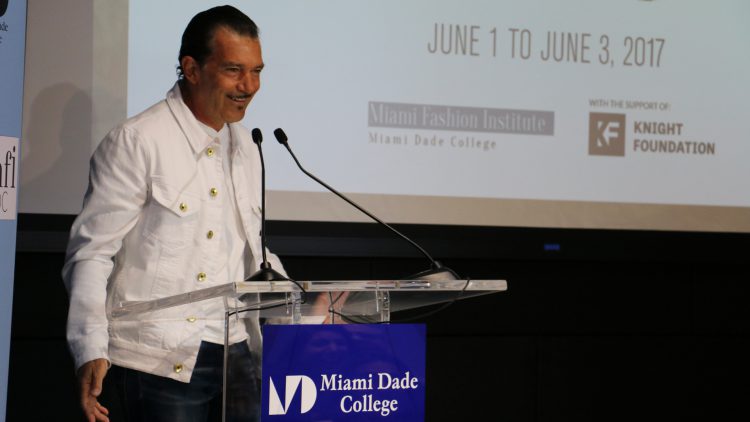Iconic actor Antonio Banderas opened Miami Fashion Week’s Master Class on June 1 by acknowledging the elephant in the room.
“This is the question that I have to answer the most: What is Zorro doing in the fashion world?” joked Banderas, who is the honorary president of Miami Fashion Week (MFW) and studied design at London’s prestigious Central Saint Martins.
The three-day class, developed in collaboration with Miami Dade College’s Miami Fashion Institute (MFI), was led by renowned industry experts including Glamour Mexico editor-in-chief Lucy Lara, former Central Saint Martins program director Willie Walters and Ecoalf president and founder Javier Goyeneche. The seminars all revolved around the same theme: how to minimize the human and environmental impact of the fashion industry.
“When I became involved with Miami Fashion Week, I wanted to respect the fashion element, but I also wanted to have a space to highlight what is behind the world of fashion,” Banderas said during his opening remarks at MDC’s Wolfson Campus.
The fashion industry is the planet’s second-largest industrial polluter, surpassed only by oil. Apparel production accounts for 10 percent of the globe’s total carbon emissions and is the second-largest polluter of fresh water. Enormous quantities of water are required for the extensive scouring, dyeing and rinsing that goes into large-scale production, which also utilizes toxic chemicals to make fabrics softer and stain-resistant.
And then there’s the shelf life. In this day and age of mass-produced “fast fashion,” more than 150 billion new garments are manufactured annually. Meanwhile, Americans throw away an estimated 13 million tons of textiles each year, accounting for 9 percent of the nation’s total non-recycled waste, according to the U.S. Environmental Protection Agency.
“Fashion can’t just be about looking good. It has to be about doing what’s right and feeling good about it,” said Goyeneche. His brand Ecoalf, for example, uses recyclable materials such as fishing nets, plastic bottles and post-industrial cotton to create its innovative, high-quality designs.
MFI Chair Asanyah Davidson said the obvious need to reduce the fashion industry’s carbon footprint led to an easy partnership between MFI and MFW in the creation of this year’s master class.
“Sustainability is one of the key focus areas of MFI and also MFW. It was a natural opportunity for collaboration,” she said.
Interested in studying fashion? Check out your options at the Miami Fashion Institute.
